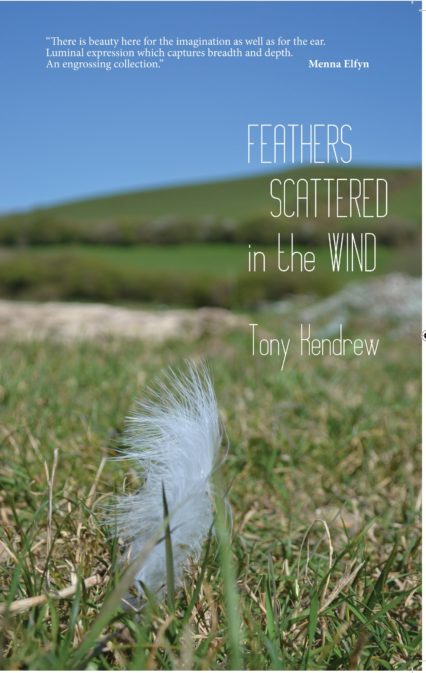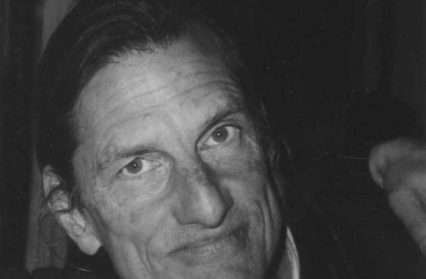78 pages, Iconau, a project from The Welsh Writing Desk, £9.99
Feathers Scattered in the Wind is the poetry collection of a writer with a hankering for travel. Tony Kendrew’s feet have trod through regions of Europe, Africa, Asia and beyond. Here, however, he decides to reflect upon two of the many places important to him: the wide open spaces of Northern California where he lived for thirty years and our Wales, the birthplace he returned to in 2012. Feathers Scattered in the Wind is a debut collection but Tony Kendrew is already an experienced poet: Turning and Beasts and Beloveds are both available on CD (the latter, the very reason he was invited to read at the Walking Words Festival in Telluride, Colorado the following year) and in the vein of the sound of poetry, Tony Kendrew’s love for music often creeps into the collection. In ʻPeregrineʼ:
exactly like these trumpets
from Verdi’s Requiem
come with such a thrill
and gone
Even when Kendrew is read on the page, we hear his voice pausing for thought between a breathy narration. It is as though pure words hang in mid-air like the feathers in the very title itself, an image I saw as a promise that this is only the beginning of a thoughtful echo; each poem a unique memento from each place visited or lived in.
 The opening poem ʻMade for Listeningʼ welcomes us into the writer’s gentle consciousness, so we become aware of the manner with which he absorbs his encounters, which he relays to us through accessible poetry that does not force us to stumble halfway through a line. Instead, we feel free to be carried by the voice of a gentle soul and we even begin to warm to his character, something not always common in poetry, where the poet often entirely dissolves into the subject. Here, we follow the experiences which mould what appears to be Kendrew’s identity as he informs us of the personal disasters which occur in a home, between two people or within one’s head; the fleeting thoughts shaken up by the vision of an old cardigan or a sweater, as though memories can be absorbed from wool itself and he doesn’t feel obligated to only reference grandiose disasters. We are given a sense of the never-ending nature of people and of “things”. Tony Kendrew has the poet’s affliction of something always being more than what it seems, or at least of always seeing (or remembering) it that way, whether it’s a bird, body part (as in the poem ‘Lips’); a hot tub, an item of clothing or a coastal path). There is always something waiting to illustrate his philosophies.
The opening poem ʻMade for Listeningʼ welcomes us into the writer’s gentle consciousness, so we become aware of the manner with which he absorbs his encounters, which he relays to us through accessible poetry that does not force us to stumble halfway through a line. Instead, we feel free to be carried by the voice of a gentle soul and we even begin to warm to his character, something not always common in poetry, where the poet often entirely dissolves into the subject. Here, we follow the experiences which mould what appears to be Kendrew’s identity as he informs us of the personal disasters which occur in a home, between two people or within one’s head; the fleeting thoughts shaken up by the vision of an old cardigan or a sweater, as though memories can be absorbed from wool itself and he doesn’t feel obligated to only reference grandiose disasters. We are given a sense of the never-ending nature of people and of “things”. Tony Kendrew has the poet’s affliction of something always being more than what it seems, or at least of always seeing (or remembering) it that way, whether it’s a bird, body part (as in the poem ‘Lips’); a hot tub, an item of clothing or a coastal path). There is always something waiting to illustrate his philosophies.
These were in a way
baby darknesses born of birth
and the prehistory of our minds
mists that evaporate
with the dawning of the light.
In ʻAbout the Darknessʼ, above, darkness is personified to be almost an immortal being, a spirit, and it is one of many poems which emphasises Kendrew’s often metaphysical gaze. There is a sound in his writing which revives what people sometimes long for in contemporary poetry as he provides space for the landscapes, the air, the sky, the breath, the wind, as though we are an audience listening to him utter every word.
This collection does not place the reader under any particular pressure. For each poem, there seems to be a subtle and natural trigger similar to the mechanism of most Haiku. In fact, ʻHot Tubʼ has the static, intangible feeling of a Haibun, and so does ʻLipsʼ:
In close up,
in times of abandon,
the face relaxes,
small lines of purpose and intention
replaced by a glow of innocence,
as the lips return to their resting place
and open as a flower opens.
This poet’s eye for detail is not laborious but instead maintains an illusion of pensive improvisation. From page to page, I could almost hear it in my head and felt convinced that the writer was not under pressure either but actually organically inspired, and I imagined him moving through the landscape, carving a poem upon a stone by ʻThe Sea at Sevenʼ:
tonight the sea is restless
too busy for my questions
its answers leave me wanting
stranded on the seaweed shore
Isn’t it right that everything interweaves? Humans blur with nature in the love of ʻSeven Views of the South Fork Riverʼ:
I had no idea
then
that I would land beside these waters
a few miles downstream
and love them as I do
which is not the way I loved her
nor the way I loved
your alpine beginnings
but with the same intensity
the same devotion.
These poems exist without command, as do the moments and landscapes. The poet, like any respectful rambler in the countryside, has not interfered but displayed the poems as he has found them, with an effortless finish. His poems often bear weight on his own inscape as much as the sensory landscape he passes through, as though it is the lens itself that he finds most interesting, which I am sure will always make for an interesting collection. What I most admire about Feathers Scattered in the Wind is the refreshing atmosphere, similar to one you might gain from a piece of mellow music.It displays the meditative way poetstap into that consciousness and outer world they end up writing about, that empathy with and from surroundings.The final poem, ʻFall in Tellurideʼ, refers again to the attentive theme of the opening poem. The line ‘because I am a listener’ brings about another question, similar to the old motif of a branch falling in the forest and questionably making a sound. Whatever the answer, I look forward to listening to and reading more of Tony Kendrew’s poetic accounts.



 Enjoyed this article? Support our writers directly by buying them a coffee and clicking this link.
Enjoyed this article? Support our writers directly by buying them a coffee and clicking this link.








